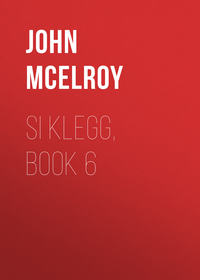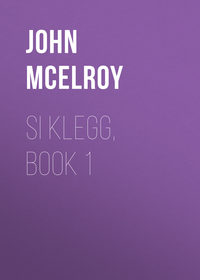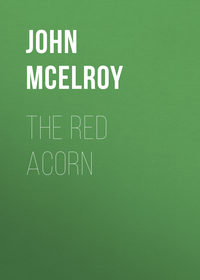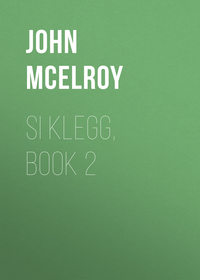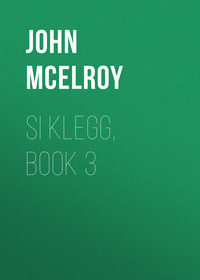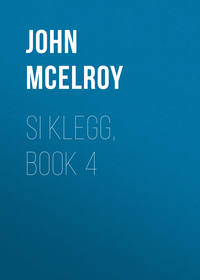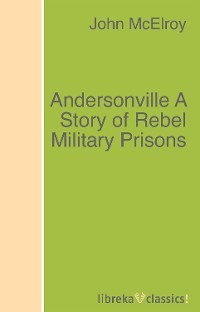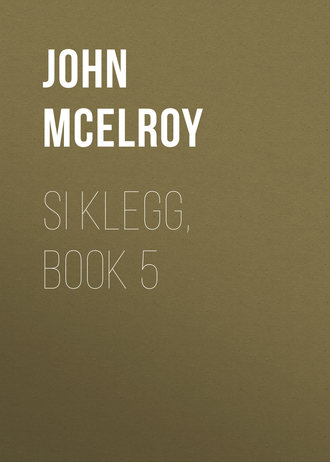 полная версия
полная версияSi Klegg, Book 5
They began at once seriously imitating the walk and manners of their heroes. The tall, lank boys modeled themselves on Shorty, and the short, chubby ones on Si. And there at once rose contention between them as to which was the greater hero.
"I heard," said Henry Joslyn, "that Corpril Elliott was the first to reach the rebel flag, he havin' much the longest legs, but jest as he grabbed it a big rebel knocked him, and then they all piled on to him, and about had him finished when Serg't Klegg reached there at a charge bayonets, and he bayoneted everybody in sight, until a sharpshooter in a tree shot him with an explosive bullet that tore his breast all to pieces, but he kept right on bayonetin' 'em till he dropped from loss o' blood. Then they fired a cannon at the sharpshooter and blowed him to pieces just as you'd blow a chippy to pieces with a bullet from a bear-gun."
"'Twan't that way at all," said tall, lathy Gid Mackall. "A whole lot of 'em made for the flag together. A charge o' grapeshot come along and blowed the rest away, but Serg't Klegg and Corpril Elliott kep' right on. Then Corpril Elliott he lit into the crowd o' rebels and laid a swath right around him, while Sergint Klegg grabbed the flag. A rebel Colonel shot him, but they couldn't stop Corpril Elliott till they shot a brass six-pounder at him."
The boys stood on the banks of the Ohio River and gazed eagerly at the other side. There was the enemy's country—there the theater in which the great drama was being enacted. Everything there had a weird fascination for them, as a part of, or accessory to, the stupendous play. It was like peeping under the circus tent, when they were smaller, and catching glimpses of the flying horses' feet.
And the questions they asked. Si had in a manner repelled them by his curt treatment of Harry Joslyn, and his preoccupied air as he went back and forth getting his orders and making preparations for starting. But Shorty was in an affable mood, and by pleasantly answering a few of their inquiries brought the whole fire of their questioning upon him.
"Are any o' them men you see over there guerrillas?" they asked.
"Mebbe," Shorty answered. "Kentucky's full of 'em. Mebbe they're peaceable citizens, though."
"How kin you tell the guerrillas from the citizens?"
"By the way they shoot at you. The peaceable citizens don't shoot—at least, in day time and out in the open. They lay for you with sole-leather pies, and chuck-a-luck boards and 40-rod whisky, and aid. and abet the Southern Confedrisy that way. They get away with more Union soldiers than the guerrillas do. But you can never tell what an able-bodied man in Kentucky'll do. He may lay for you all day with wildcat whisky, at $5 a canteenful, to git money to buy ammunition to shoot at you at night. He's surer o' gittin' you with a canteen o' never-miss whisky, but there's more healthy excitement about shootin' at you from behind a bank. And his pies is deadlier'n his apple-jack. A man kin git over an apple-jack drunk, but Kentucky pies 's wuss'n nux vomica on fish."
"Mustn't we eat none o' their pies?" asked the boys, with longing remembrance of the fragrant products of their mothers' ovens.
"Nary a pie. If I ketch a boy eatin' a pie after we cross the river I'll buck-and-gag him. Stick to plain hardtack and pork. You'll git to like it better'n cake by and by. I eat it right along in preference to the finest cake ever baked."
Shorty did not think it necessary to mention that this preference was somewhat compulsory.
"Why don't you hunt down the guerrillas and kill 'em off and be done with 'em?"
"You can't, very well. You see, guerrilain' is peculiar. There's somethin' in the air and water down in Kentucky and Tennessee that brings it on a man. You'll see a plain farmer man, jest like them around your home, and he'll be all right, goin' about his place plowin' and grubbin' sprouts and tendin' to his stock, and tellin' you all the time how much he loves the Union and how he and his folks always bin for the Union. Next thing you know he'll be out behind a cedar bush with a shotgun loaded with slugs, waitin' to make a lead mine o' some feller wearin' blue clothes. You see him before he does you, and he'll swear that he was out after the crows that's bin pullin' up his corn. He'll take' the oath of allegiance like it was a dram of old apple-jack, and tears'll come into his eyes at the sight o' the Old Flag, which he and his'n has always loved. He'll go ahead plowin' and grubbin' sprouts and tendin' his cattle till the fit comes on him agin to go gunnin' for bluecoats, and off he is, to go through the whole performance agin. You kin never tell how long his loosid interval will last, nor when the fit's comin' on him. Mebbe the changes o' the moon's somethin' to do with it. Mebbe it's somethin' that they eat, like what the cattle eat out West that makes 'em go crazy."
"Will the guerrillas begin shootin' at us as soon's we cross the river?"
"Can't tell. Guerrillas's like the nose-bleed—likely to come on you at any time. They're jest where you find 'em—that's when they're jumpin' you.. When they aint jumpin' you, they're lawabiding Union citizens, entitled to the protection o' the laws and to draw rations from the Commissary. To make no mistake, you want to play every man in citizen's clothes south of the Ohio River for a rebel. And when you don't see him, you want to be surer than ever, for then he's layin' for you."
Si came up at this moment with orders for them to pick up and go down to the ferry, and the lively hustle shut off Shorty's stream of information for the time being. The boys swarmed on to the bow of the ferry-boat, where they could scrutinize and devour with eager eyes the fateful shore of Kentucky.
"Don't look so very different from the Indiana side," said Harry Joslyn, as they neared the wharf. "Same kind o' wharf-boats and same kind o' men on 'em."
"That's because we've taken 'em and have our own men there," replied Gid Mackall. "It'll all be different when we git ashore and further into the State."
"Wasn't expecting nothing else," said Albert Grimes. "I've been watchin' the Sargint and Corpril, and they're acting just as if it was every day bizniss. I'm not going to expect anything till I see them lookin' serious."
They landed and walked to the depot through the streets of Louisville, which were also disappointingly like those they had seen elsewhere, with the stores open and people going about their business, as if no shadow of war brooded over the land. There were some more soldiers on the streets, and a considerable portion of the vehicles were army wagons, but this was all.
"When'll we see some rebels?" the boys asked.
"Don't be impatient," said a soldier on the sidewalk; "you'll see 'em soon enough, and more'n you want to. You'll have to go a little further, but you'll find the woods full of 'em. You'll be wishin' you was back home in your little trundle-beds, where they ought've kept you."
"Shut up, you coffee-boiler," shouted Shorty, striding toward him. "These boys 's goin' to the front, where you ought to be, and I won't have you sayin' a word to discourage 'em."
"Too bad about discouraging 'em," laughed another, who had a juster appreciation of the situation. "You couldn't discourage that drove of kids with a hickory club."
After the train left Louisville it passed between two strong forts bristling with heavy guns. Here was a reality of war, and the boys' tide of questions became a torrent that for once overslaughed Shorty's fine talent for fiction and misinformation.
"How many battles had been fought there?"
"How many Union soldiers had been killed?"
"How many rebels?"
"Where were they buried?"
"How big a ball did the guns shoot?"
"How far would it carry?"
"How many men would it kill if they were put one behind another?"
"How near would the guns come to hitting a man a mile off?"
"Could the gunner knock a man's head off, or one of his legs, just as he pleased?"
"Were the guns rifled or smooth-bore?"
"How much powder did it take to load them?"
"How hard did they kick when they were fired?"
"Did they have flint-locks or caps?"
"Did they ever fire chain-shot, which would cut down trees and sweep away companies of men?"
"If all the rest of the men were killed wouldn't the powder-monkey get a chance to fire the gun?"
"Look here, boys," gasped Shorty, when he got a chance to answer, "I'd like to answer your questions and fill you so plumb full o' information that your hides'd crack to hold it. But I aint no complete history o' the war with heavy artillery tactics bound up in one volume. All I know is that the worst dose them forts ever give was to the fellers that had to build 'em. After you've dug and shoveled and wheeled on one of 'em for about a month you'll hate the very sight of 'em and never ask no questions about 'em. All you'll want'll be to find and kill the feller that invented them brick-red eruptions on the face o' the earth."
This was a prosaic side of the war that had not occurred to the boys.
As the train ran out into the country there were plentiful signs of war to rivet the attention of the youngsters—hospitals, with the emaciated patients strolling feebly about; corrals of mules and horses, the waste and wreckage where camps had been, and bridges which had been burned and rebuilt.
"But we haint seen no guerrillas yit," said Harry Joslyn and Gid Mackall, whose minds seemed more fascinated with that species of an enemy than any other, and they apparently voiced the minds of the rest. "When're we likely to see some guerrillas?"
"O, the guerrillas are layin' purty low now, betwixt here and Nashville," Si carelessly explained. "After we pass Nashville you kin begin to look out for 'em."
"Why," Gid Mackall complained to the rest of them, "Corpril Elliott said that we could begin to look out for guerrillas jest as soon's we crossed the Ohio—that the whole o' Kentucky was full of 'em. I believe Corpril Elliott knows more about his business than Sargint Klegg. Sargint Klegg seems careless like. I see lots o' fellers along the road in butternut clothes that seemed savage and sneaky like. They looked at us in a way that made me certain they wuz spying us, and had their guns hid away somewhere, ready to jump us whenever there wuz a good chanst."
"So did I," chorused the others.
The train made a long stop on a switch and manuvered around a while, taking on some cars found there, and Si and Shorty seeing nothing to do went forward to another car, where they found some returning veterans, and were soon absorbed in a game of seven-up. Shorty had just successfully turned a jack from the bottom, and was snickering to himself that his fingers had not lost their cunning by long idleness, when the game was interrupted by a train-hand rushing up with the information:
"Here, you fellers, you want to git out there and 'tend to them kids o' your'n. They've got a couple o' citizens down there in the brush and I believe are goin' to hang 'em."
Si and Shorty ran down in the direction indicated. They found the boys, stern-eyed and resolute, surrounding two weak-eyed, trembling "crackers," who had apparently come to the train with baskets of leathery-crusted dried-apple pies for sale. The men were specimens of the weak-minded, weak-bodied, lank-haired "po' white trash," but the boys had sized them up on sight as dangerous spies and guerrillas, had laid hands on them and dragged them down into the brush, where Gid Mackall and Harry Joslyn were doing a fair reproduction of Williams, Paulding and Van Wert searching Maj. Andre's clothes for incriminating documents. They had the prisoners' hands tied behind them and their ankles bound. So far they had discovered a clumsy brass-barreled pistol and an ugly-looking spring dirk, which were sufficient to confirm the dangerous character of the men. Two of the boys had secured ropes from the train, which they were trying to fashion into hangman's nooses. Gid and Harry finished a painstaking examination of the men's ragged jeans vests, with a look of disappointment at finding nothing more inculpating that some fishhooks, chunks of twist tobacco and cob-pipes.
"They must have 'em in their boots, boys. Pull 'em off," said Harry. "There's where spies usually carry their most important papers."
"Here, you young brats, what are you up to?" demanded Si, striding in among them.
"Why, Sargint," said Harry Joslyn, speaking as if confident of being engaged in a praisworthy work, which should receive the commendation of his superiors, "these're two spies and guerrillas that we ketched right in the act, and we're searchin' 'em for evidence to hang 'em."
"Spies nothin'!" said Si. "Why, them fellers hain't brains enough to tell a battery from a regiment, nor pluck enough to take a settin' hen offen her nest. Let them go at once."
"Why, Corpril Elliott told us that every man in Kentucky, particularly them what sold pies, wuz dangerous, and liable to go guerrillying at any minute," said Harry in an aggrieved tone. "These fellers seemed to be sneakin' down to find that we hadn't no guns and then jump us."
"Well, what I said wuz true on jineral principles," laughed Shorty. "But there's occasionally exceptions to even what I tell you. These fellers are as harmless as garter-snakes. Why didn't you come and speak to us?"
"Why, you shoved our car out there into the brush and went off and left us. We thought we had to look out for ourselves," explained Harry. "Can't we hang 'em, anyway?" he added in an appealing tone, and the rest of the boys looked wistfully at Si for permission to proceed.
"No, you can't, I tell you. Turn 'em loose this minute, and give 'em back their things, and go yourselves to your car. We're goin' to start now. Here," he continued to the two men, "is a dollar. Take your pies and dig out. Don't attempt to sell any o' them pies to these boys, or I'll hang you myself, and there won't be no foolishness about it. Git back to your car, boys."
"There won't be no hangin', and we won't git none o' the pies," complained the boys among themselves. "Sargint Klegg's gittin' overbearin'. What'd he interfere for? Them fellers was guerrillas, as sure as you're born, just as Corpril Elliott described 'em before we crossed the river."
CHAPTER XVII. THE FRIGHTENED SURGEON
SI AND SHORTY HAVE A TIME WITH THEIR WILD, YOUNG SQUADMUCH to their amazement, the boys waked up the next morning in Nashville, and found that they had passed through the "dark and bloody ground" of Kentucky absolutely without adventure.
"How in the world'd we ever git clean through the State without the least bit o' trouble?" asked Harry Joslyn, as they stood together on the platform awaiting the return of Si and Shorty, who had gone to see about their breakfast. "It was fight from the word go with the other men from the minute they struck Kentucky."
"Probably it was Corpril Elliott's good management," suggested Gid Mackall, whose hero-worship of Shorty grew apace. "I tell you there aint a trick o' soldierin' that he aint up to."
"Corpril Elliott's?" sneered Harry Joslyn. "You're just stuck on Corpril Elliott. If it was anybody's good management it was Sargint Klegg's. I tell you, he's the boss. He got shot through the breast, while Corpril Elliott only got a crack over the head. That settles it as to who's the best soldier. I'm kind o' sorry that we didn't have no trouble. Mebbe the folks at home'll git the idea that we skulked and dodged."
"That's so," accorded the others, with a troubled look.
"But we are now in Tennessee," chirped in Gid Mackall hopefully. "That's ever so much worse'n Kentucky. We must come to rebels purty soon now. They won't let so many reinforcements git to Gen. Thomas if they kin help it." And Gid looked around on his companions, as if he thought their arrival would turn the scale and settle the fate of the Confederacy. "They'll probably jump us just as soon as we leave town. Them big forts on the hills mebbe keeps them outside now, but they're layin' for us just beyond. Wonder if we'll git our guns here? Mebbe that's what the Sargint and Corpril's gone for."
"They said they were going for our breakfast," said Harry. "And I hope it's true, for I'm hungrier'n a rip-saw. But I could put off breakfast for awhile, if they'd only bring us our guns. I hope they'll be nice Springfield rifles that'll kill a man at a mile."
"'Tention!" commanded Si. "Fall in single rank 'cordin' to your size. Tall boys on the right, short ones on the left, medium in the center. Gid Mackall, you're the tallest. You can go there to the corner o' the platform and let the others form on you."
Si stepped back into the shed to look after some matters.
Harry Joslyn whipped around and took his stand on the right of Gid Mackall.
"Here," protested Gid; "Sargint Klegg told me to stand on the right. You're smaller'n me. Git on the other side."
"I won't do it," answered Harry. "I've always stood ahead o' you in school, ever since we were in the primer class, and I aint goin' to stand behind you in the army. You needn't try to gouge me out o' my rights because you're half-a-head taller. I'm two months older'n you, and I can throw you in a wrastle every time."
"I tell you," said Gid, giving Harry an angry shove toward the left, "that this is my place, and I'm goin' to stand here. The Sargint told me to. Go down where you belong, you little rat."
The hot-headed Harry mixed up with him immediately, school-boy fashion. Shorty rushed up and separated the two, giving Harry a sharp shake. "Stop that, and go down to your place in the center," said he.
"Yes; you side with him," whimpered Harry, "because he praises you and says you're a better soldier'n Sargint Klegg. I'm goin' to tell Sargint Klegg that."
"Here," said Si, sternly, as he came back again. "What's all this row? Why don't you boys fall in 'cordin' to size, as I told you?"
"Sargint," protested Harry, "Gid Mackall wants to stand at the head o' the class. I'm older'n him, I can spell him down, and I can throw him in—"
Si interrupted the appeal by taking Harry by the ear and marching him to his place.
"Look here," he said, "when you git an order from anyone, don't give 'em no back talk. That's the first thing you've got to learn, and the earlier you learn it the less trouble you'll have. If you don't like it, take it out in swearin' under your breath, but obey."
"But, Sargint, he said that Corpril Elliott was a better soldier'n"
"Silence in ranks," said Si, giving him a shake. "Right dress. Come out in the center. Mackall, stand up straight there. Take that hump out o' your shoulders. Put your heels together, all of you. Turn your toes out. Put your little fingers down to the seams o' your pantaloons. Draw your stomachs in. Throw your chests out. Hold your heads up. Keep your faces straight to the front, and cast your eyes to the right until you kin see the buttons on the breast o' the third man to your right. Come forward until they're in line.
"Goodness," moaned some of the boys, as they were trying to obey what seemed a' hopeless mass of directions, "do we have to do this every mornin' before we kin have breakfast? We'll starve to death before we git anything to eat. No use tellin' us to draw our stomachs in. They're clean in to our backbones now."
"Mustn't talk in ranks, boys," Shorty kindly admonished. "It's strictly agin' regulations. Straighten up, there, like soldiers, all o' you, and git into a line. Looks like a ram's horn now. If the rebels'd shoot down that line they wouldn't hit one o' you."
Jim Humphries, one of the medium-sized boys, suddenly turned as white as a sheet and fell on the planks. One after another of those around him did the same, until a half-dozen were lying there in a heap.
"What in the world's the matter?" asked Si, rushing up to them in dismay.
"They're pizened, that's what they are," shouted Harry Joslyn. "That guerrilla goin' over there pizened 'em. I saw him a-givin' 'em something. He's tryin' to git away. Le's ketch him."
At the word the boys made a rush for the man who was quietly walking off. As they ran they threw stones, which went with astonishing precision and force. One of them struck the man on the head and felled him. Then the boys jumped on him and began pounding and kicking him. Si and Shorty came up, pushed off the boys and pulled the man to his feet. He was terrified at the onset which had been made upon him, and could not understand its reason.
"What've I done?" he gasped. "What're all yo'uns weltin' me for? I haint no rebel. I've done tuk the oath of allegiance long ago."
"Now there'll be a hangin' sure," said Harry, in eager expectancy.
"What'd you do to them boys back there?" demanded Si.
"Didn't do nothin' to 'em. Sw'ar to God A'mighty I didn't."
"That telegraph pole will be just the thing to hang him on," suggested Harry to Gid. "We could put him on a flat car and push the car out from under him. I'll look around for a rope, Gid, and you git ready to climb the pole."
"He did do something to 'em, Sargint," said Gid Mackall. "I seen him givin' 'em something."
"'Twas only a little mite o' terbacker," the man explained. "They'uns said they'uns was mouty hongry, and wanted t' know if I'd anything t' eat. I hadn't nothing, but I done had a little terbacker, which I tole 'em'd take away the hongry feelin', and I gin each o' they'uns a lettle chaw."
"I shouldn't wonder but he's tellin' the truth," Shorty whispered to Si. "Le's take him back there and see."
Coming back to the platform they found the boys there recovering but still very weak and pale. They confirmed the story about the tobacco. Shorty examined the rest of the tobacco in the man's possession with the practiced taste of a connoisseur, found it strong black plug, just the thing to upset a green boy who took it on an empty stomach, cut off a liberal chew for himself and dismissed the man with a kick.
"Now, le's form agin and march to breakfast. Great Scott, how hungry I am," said Si. "'Tention. Fall in 'cordin' to size. Single rank."
"What's size got to do with gittin' breakfast?" complained Harry Joslyn, who had another grievance, now that he had again been disappointed in hanging a guerrilla. "Biggest boys'll git there first and get the most to eat. The rest of us need just as much as they do."
"Silence in the ranks," commanded Shorty, snappishly. "Don't fool around. Git into your place and stay there. We want breakfast some time today."
Shorty lined up the boys in a hurry and Si commanded.
"Right dress! Come out a little there on the left! Steady! Without doublin', right face!"
A squad of Provost-Guards came up at a double-quick, deployed, surrounded the squad and began bunching the boys together rather roughly, using the butts of their muskets.
"What does this mean?" Si asked angrily of the Lieutenant in command.
"It means that you and your precious gang have to go down to Provo' Headquarters at once," answered the Lieutenant. "And no words about it. Forward, march, now."
"But you've got no business to interfere with me," protested Si. "I've got my orders to take this squad o' recruits to my regiment, and I'm doin' it. I'm goin' to put 'em on the cars as soon's I kin git breakfast for 'em, and start for Chattanoogy."
"Well, why didn't you get breakfast for them and put them on the cars peaceably and quietly, without letting them riot around and kill citizens and do all manner of devilment. You have a fine account to settle."
"But they haint killed no citizen. They haint bin riotin' around, and I ain't a-goin' with you. You've no right, I tell you, to interfere with me."
"Well, you just will go with me, and no more chinning."
A Major, attracted by the altercation, rode up and asked what was the matter.
"Word came to Headquarters," explained the Lieutenant, "that a squad of recruits were rioting, and had killed a citizen, and I was sent down here on the run to stop it and arrest the men. This Sergeant, who seems to be in command, refuses to go with me."
"I tell you, Major," said Si, who recognized the officer as belonging to his brigade, "there was nobody killed, or even badly hurt. These little roosters got up a school-yard scrap all about a mistake; it was all over in a minute. There's the man they say was killed, settin' over there on that pile o' lumber smokin' his pipe."


